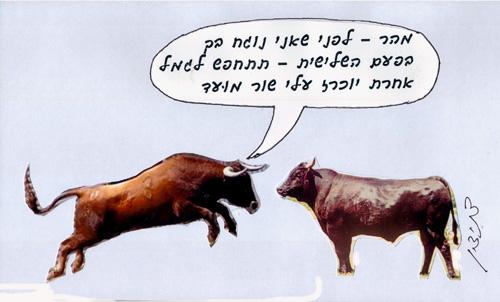
In the era of Chazal the economy was based on a pastoral, agrarian society. Therefore oxen and other domesticated animals were common in the streets of towns and villages. By their nature animals harm each other, and often oxen gore one another and various other animals. Therefore the Torah, the Mishnah, and the Talmud dealt at length with the laws of damages caused by oxen. It is written in the Torah, “If it be known that the ox has gored in the past [what the sages call a “warned ox”] and his owner has not kept him in, he shall surely pay ox for ox” (Exodus 21:36). But if the ox has gored for the very first time, its owner pays half the cost of the damage. It is written in the Torah, “If one man’s ox hurts another’s, causing its death, then they shall sell the live ox and divide the money from it.” When is an ox to be considered “warned”? The sages ruled that it earns that designation after three incidents of goring. Mounds of discussion in the Talmud revolve around the designation of a warned ox. Thus, for example, the sages ruled that an ox which has gored three oxen is warned only about oxen, but is not warned about camels and donkeys; in regard to them it is considered an “innocent” ox (and its owner only pays half the damages). What is the rule if the ox gores only on the Sabbath? If it gores on three consecutive Sabbaths it is warned only about Sabbaths, so if this ox then gores on a weekday, it is considered an innocent ox (and its owner only pays half the damages). If the ox gored three different kind of animals, it is warned about all animals (for example, if an ox gored an ox, a camel, and a donkey). The scholars ask what the rule is for an ox which gored an ox, another ox, a third ox, a donkey, and then a camel. How is this ox to be judged: as warned about oxen only, or as warned about all animals? What are the issues under debate? On one hand, after the ox gored three oxen in a row, he is warned about oxen only. On the other hand, one could argue that it gored an ox, a donkey, and a camel, and so is to be warned about all animals. Is the third ox part of a series of oxen, along with the first two oxen (in which case the ox would be warned only about oxen), or part of a series of three types of animals, along with the donkey and the camel (in which case it would be warned about all animals)? (This question was not resolved in the Talmud.)
(Babylonian Talmud, Tractate Bava Kama 37a-b)
